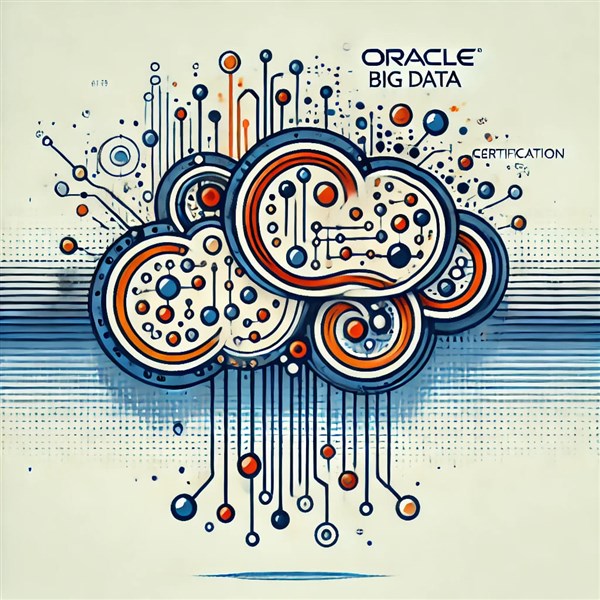
In the present world where data is the new oil, big data technologies have become a crucial element in the IT industry. One of the leading names in this field is Oracle, offering the most comprehensive big data solutions. As a result, Oracle Big Data training and certification has gained immense popularity among IT professionals.
In today's data-driven world, businesses are increasingly relying on big data to make informed decisions, enhance customer experiences, and improve operational efficiencies. As a result, the demand for professionals skilled in big data management, analytics, and infrastructure has grown exponentially. Oracle, a global leader in database technologies, offers a suite of certifications in big data that help professionals validate their expertise in managing large datasets, leveraging Oracle’s tools, and driving impactful big data projects.
This guide explores Oracle's Big Data certifications, how they align with different career roles, and the steps you need to take to get started with Oracle Big Data training.
Overview of Oracle's Big Data Certifications
Oracle offers a range of certifications that cover various aspects of big data, from data engineering and analytics to cloud architecture. These certifications are designed for professionals at different stages of their careers, whether they are beginners, experienced data professionals, or IT leaders looking to enhance their big data capabilities. Below are the primary Oracle Big Data certifications:
1. Oracle Big Data Certified Implementation Specialist
- Target Audience: This certification is designed for professionals who implement Oracle Big Data solutions, including architects, developers, and IT consultants.
- Skills Validated: This certification covers key Oracle Big Data technologies such as Oracle Big Data Appliance, Oracle NoSQL Database, and Oracle Big Data SQL. It tests your ability to deploy, configure, and optimize Oracle Big Data infrastructure.
- Career Roles: Big Data Architects, Data Engineers, System Integrators.
2. Oracle Cloud Infrastructure (OCI) Data Science Certification
- Target Audience: Designed for data scientists and analytics professionals who work in cloud environments and are responsible for building, training, and deploying machine learning models on Oracle Cloud.
- Skills Validated: This certification emphasizes skills in using Oracle Cloud Infrastructure Data Science tools for data analysis, feature engineering, model training, and model evaluation.
- Career Roles: Data Scientists, Machine Learning Engineers, Cloud Data Analysts.
3. Oracle Business Intelligence (BI) Certification
- Target Audience: Geared towards business analysts and data professionals who use Oracle's Business Intelligence solutions for reporting and data visualization.
- Skills Validated: This certification focuses on Oracle Business Intelligence tools, including Oracle BI Enterprise Edition (OBIEE) and Oracle BI Publisher. It covers creating dashboards, developing reports, and designing data models.
- Career Roles: Business Analysts, Data Visualization Specialists, Reporting Analysts.
4. Oracle Big Data Cloud Service Specialist Certification
- Target Audience: For cloud architects and IT professionals working with Oracle's Big Data Cloud Service.
- Skills Validated: The certification covers skills in managing and optimizing Oracle Big Data Cloud Service, leveraging Hadoop clusters, and integrating Oracle Cloud services with big data workloads.
- Career Roles: Cloud Architects, IT Administrators, Big Data Engineers.
5. Oracle Autonomous Database Specialist
- Target Audience: This certification is for database administrators and data architects who want to specialize in Oracle's Autonomous Database technologies, including big data and data lakes.
- Skills Validated: It covers deploying and managing Oracle Autonomous Databases, automating database tasks, and ensuring data security.
- Career Roles: Database Administrators, Data Architects, Cloud Data Engineers.
How Oracle Certifications Validate Expertise in Big Data Projects
Oracle’s Big Data certifications are designed to validate both practical and theoretical knowledge of managing complex data environments. Here’s how these certifications help demonstrate your expertise:
1. Hands-On Experience
Oracle’s certifications emphasize hands-on experience with real-world tools and applications. By earning an Oracle Big Data certification, you prove that you have direct experience with Oracle’s big data ecosystem, including handling and analyzing large datasets, working with distributed databases, and integrating big data with cloud services.
2. Industry Recognition
Oracle is a well-established name in the technology industry, and its certifications are globally recognized. Employers value Oracle-certified professionals because they bring a deep understanding of database management and big data infrastructure. Oracle certifications validate your proficiency in industry-standard tools, which increases your employability in a highly competitive job market.
3. Proof of Competency in Key Big Data Technologies
Earning Oracle Big Data certifications confirms that you have mastered Oracle's big data technologies, such as Oracle Big Data Appliance, Oracle Big Data SQL, and Oracle NoSQL Database. These technologies are essential for big data management and analytics, and certification ensures that you are well-equipped to use them effectively in real-world scenarios.
4. Alignment with Modern Cloud Technologies
As more organizations move their data infrastructure to the cloud, Oracle's certifications in Big Data and Cloud Computing help professionals stay ahead of the curve. Certifications such as Oracle Cloud Infrastructure Data Science and Oracle Big Data Cloud Service Specialist validate your ability to manage big data in cloud environments, which is critical in today’s hybrid IT infrastructures.
Steps to Get Started with Oracle Big Data Training
Earning an Oracle Big Data certification requires a clear strategy, dedication, and access to the right resources. Here’s a step-by-step guide to help you navigate the certification process:
1. Identify Your Career Path
The first step in your Oracle Big Data certification journey is to assess your current skills, experience level, and career goals. If you are new to big data, you might want to start with the Oracle Big Data Certified Implementation Specialist certification. For those with more experience in cloud infrastructure, the Oracle Cloud Infrastructure Data Science certification may be a better fit.
- Beginner: Start with fundamental certifications like Oracle Big Data Certified Implementation Specialist.
- Intermediate/Advanced: Choose more advanced certifications like Oracle Big Data Cloud Service Specialist or Oracle Cloud Infrastructure Data Science.
2. Enroll in Oracle Training Courses
Oracle offers a variety of online and instructor-led training courses to help you prepare for your certifications. These courses provide a mix of theoretical learning and hands-on lab sessions. For big data certifications, Oracle's Big Data Learning Subscription is highly recommended, as it covers the full range of technologies and tools you’ll need to pass the exams.
Key training platforms include:
- Oracle University
- Oracle Learning Subscriptions
- Online resources such as Udemy, Coursera, and Pluralsight
3. Use Practice Exams and Study Guides
Practice exams are a great way to test your knowledge before taking the actual certification test. Oracle provides official exam guides and sample questions to help you familiarize yourself with the format and topics covered in the exam. Additionally, numerous third-party websites offer free practice tests and study materials.
- Use Oracle’s official practice tests.
- Refer to certification-specific study guides.
- Participate in forums and online communities where you can discuss questions with other candidates.
4. Gain Hands-On Experience
Practical experience is key to passing Oracle’s Big Data certification exams. If possible, work on real-world big data projects, either through your job or personal initiatives. Many cloud platforms, including Oracle Cloud, offer free tiers where you can practice deploying and managing big data solutions.
- Leverage Oracle Cloud’s free-tier services for hands-on experience.
- Work on sample big data projects to apply your knowledge.
5. Schedule and Take the Exam
Once you feel confident in your knowledge and skills, register for the certification exam through the Oracle website. Oracle certifications typically require passing one or more proctored exams, and you can choose to take them online or at a testing center.
- Register for the exam at Oracle Certification.
- Schedule your exam at a time that allows you to adequately prepare.
Conclusion
Oracle’s Big Data certifications are a powerful way to validate your expertise in handling, analyzing, and managing large datasets using Oracle’s state-of-the-art technologies. Whether you are just starting your career in big data or looking to advance to more specialized roles, these certifications can help you stand out in the job market, improve your technical capabilities, and prepare you for the rapidly evolving data landscape. By following the steps outlined in this guide, you can confidently embark on your Oracle Big Data certification journey and take the next step toward becoming a certified Oracle Big Data professional.
When it comes to Big Data solutions, Oracle is a name to reckon with. The Oracle Big Data Certification validates your skills and knowledge in this domain, setting you apart in the competitive IT industry.
At Koenig Solutions, a leading IT training company, we provide top-notch training for Oracle Big Data Certification. Our expert trainers, comprehensive course material, and practical training approach ensure you are well prepared to ace your certification exams.







COMMENT